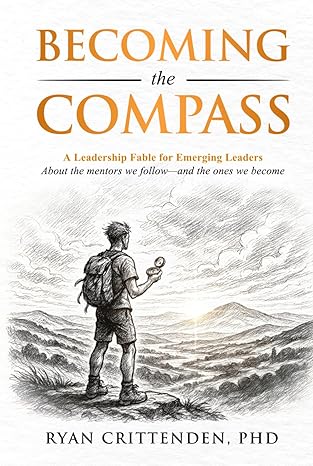Explore More
Why New Age Leaders Are Skipping MBA Manuals for Streetwise Leadership Stories
Explore ‘Becoming the Compass’–a story-driven leadership book offering emerging founders practical wisdom, authentic connection and real-world guidance

First-time founders and self-made leaders are ditching dense management theory for practical leadership stories.
Recent data shows that whilst traditional MBA textbooks focus on abstract frameworks, emerging leaders favour story-driven guides that offer field-tested wisdom over classroom concepts.
‘Becoming the Compass: A Leadership Fable for Emerging Leaders’ by Ryan Crittenden is available free on Kindle until 20 June, joining a growing library of narrative-based leadership resources that prioritise real-world application.
The Problem with Old-School Business Books
Traditional business education relies on case studies written by academics who’ve never run payroll or fired someone who wasn’t performing. These books present leadership as a series of best practices and theoretical models that sound impressive in boardrooms but fall apart when you’re dealing with actual people problems.
Emerging leaders building mid-size firms don’t have time to decode abstract management theories. They need guidance that feels authentic and addresses the messy realities of leadership – not sanitised case studies from Fortune 500 companies with unlimited HR departments. The $225 billion leadership crisis shows how traditional approaches fail when workplace toxicity hits.
Story-based leadership fables like Patrick Lencioni’s works have sold over six million copies worldwide, consistently ranking high on Amazon bestseller lists. These books succeed because they present leadership challenges through relatable narratives rather than academic frameworks.
What ‘Becoming the Compass’ Offers
‘Becoming the Compass’ follows Alex, a rising leader confronting toxic workplace culture and organisational uncertainty. The book teaches four core principles designed for practical application: relational strength, authentic presence, purposeful resilience and growth through challenges.
Unlike management textbooks that treat leadership as a series of techniques to master, Crittenden’s approach acknowledges that real leadership happens in the grey areas where theory meets human nature. The book addresses situations that emerging leaders actually face – not hypothetical scenarios crafted for academic discussion.
The four principles aren’t abstract concepts but practical tools for building trust, maintaining authenticity under pressure, bouncing back from setbacks and using difficulties to sharpen leadership skills. Each principle connects directly to common challenges faced by founders building significant businesses and managers stepping into bigger roles.
A Quote That Defines the Approach
‘This book is for leaders who are ready to stop chasing perfection and start leading from who they truly are,’ says Crittenden. That perspective separates practical leadership guides from motivational abstractions that promise transformation through positive thinking.
The emphasis on authenticity over performance reflects how emerging leaders who’ve seen polished executives fail when faced with real pressure want guidance from people who’ve navigated similar challenges, not theorists who’ve studied leadership from a distance. Trust and betrayal issues in leadership often expose the gap between theory and practice.
Crittenden combines military experience with strengths-based coaching, offering perspective from someone who’s led in high-stakes environments. This background resonates with founders and emerging leaders who need proven approaches rather than untested theories.
Who’s Reading These Books
The target audience for ‘Becoming the Compass’ reflects a growing demographic: emerging leaders building something significant from scratch or stepping into more demanding roles this year. These aren’t corporate middle managers climbing predictable career ladders – they’re founders, partners and directors dealing with the unique pressures of fast-growth businesses.
Startup founders in 2024 and this year choose practical startup books that provide actionable insights through real interviews and case studies rather than traditional academic business texts. They want books that help them make immediate progress rather than vanity metrics that look good on paper.
The free availability on Kindle until 20 June makes the book accessible to emerging leaders who are investing in their development but haven’t reached the point where they’re buying expensive executive development programmes. Building connections through shared reading experiences also helps leaders develop their networks.
Business Leaders Cite Story-Driven Books
Business leaders increasingly cite story-driven leadership books as significant sources of inspiration and practical guidance. The appeal lies in books that combine timeless narratives with applicable leadership lessons.
The contrast with traditional MBA education is stark. Business schools teach frameworks and models that work in controlled environments. Real leadership happens in uncontrolled environments where people make emotional decisions, markets shift unexpectedly and the best-laid plans require constant adaptation.
Leadership fables address this gap by presenting principles through stories that feel familiar to anyone who’s dealt with difficult team members, uncertain market conditions or the pressure of making decisions without complete information. The crowded book market means only the most practical, authentic leadership content breaks through.
Next Steps
‘Becoming the Compass’ is available as a free download on Amazon Kindle from 16–20 June. The book joins other story-based leadership resources that prioritise practical application over theoretical perfection.
The five-day window represents an opportunity to evaluate whether narrative-based leadership development offers more value than traditional business education approaches. For emerging leaders building something significant, it’s worth comparing this practical approach against the abstract theories that dominate most business education programmes.





